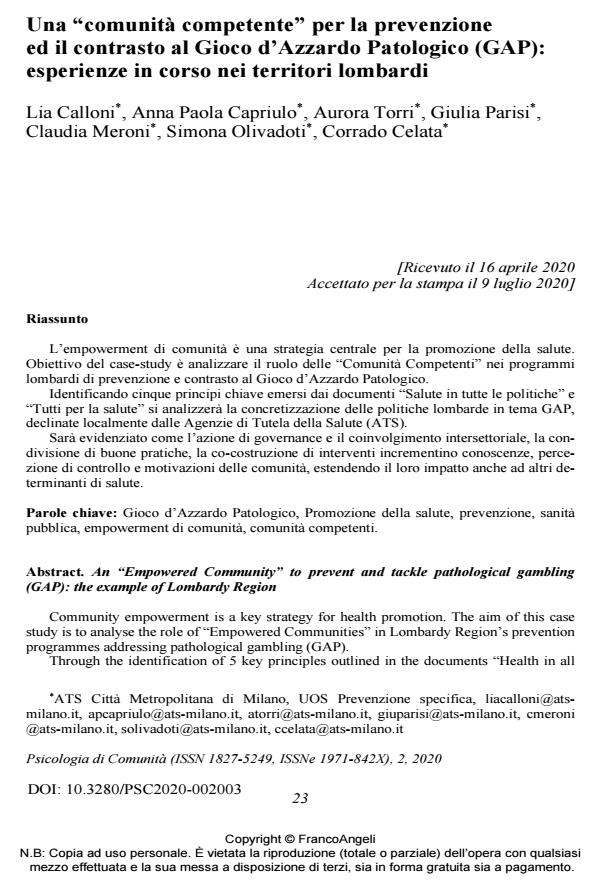An "Empowered Community" to prevent and tackle pathological gambling (GAP): the ex-ample of Lombardy Region
Journal title PSICOLOGIA DI COMUNITA’
Author/s Lia Calloni, Anna Paola Capriulo, Aurora Torri, Giulia Parisi, Claudia Meroni, Simona Olivadoti, Corrado Celata
Publishing Year 2020 Issue 2020/2
Language Italian Pages 18 P. 23-40 File size 320 KB
DOI 10.3280/PSC2020-002003
DOI is like a bar code for intellectual property: to have more infomation
click here
Below, you can see the article first page
If you want to buy this article in PDF format, you can do it, following the instructions to buy download credits

FrancoAngeli is member of Publishers International Linking Association, Inc (PILA), a not-for-profit association which run the CrossRef service enabling links to and from online scholarly content.
Community empowerment is a key strategy for health promotion. The aim of this case study is to analyse the role of "Empowered Communities" in Lombardy Region’s prevention programmes addressing pathological gambling (GAP). Through the identification of 5 key principles outlined in the documents "Health in all policies" and "Health for all, all for health", the authors analyse policies on the topic of GAP developed in Lombardy region and their local implementations carried out by Health Protection Agencies (ATS). The authors describe actions taken to engage stakeholders with an intersectoral approach, to value good practices and co-create interventions from a participated governance perspective. Increase in knowledge, perception of control and community motivation was obtained thanks to these actions, thus offering an example that can be applied to other health determinants.
Keywords: Pathological gambling, health promotion, prevention, public health, community empowerment, empowered community.
- Prevention and Harm Reduction Interventions for Adult Gambling at the Local Level: An Umbrella Review of Empirical Evidence Veronica Velasco, Paola Scattola, Laura Gavazzeni, Lara Marchesi, Ioana Elena Nita, Gilberto Giudici, in International Journal of Environmental Research and Public Health /2021 pp.9484
DOI: 10.3390/ijerph18189484
Lia Calloni, Anna Paola Capriulo, Aurora Torri, Giulia Parisi, Claudia Meroni, Simona Olivadoti, Corrado Celata, Una "comunità competente" per la prevenzione ed il contrasto al Gioco d’Azzardo Patologico (GAP): esperienze in corso nei territori lombardi in "PSICOLOGIA DI COMUNITA’" 2/2020, pp 23-40, DOI: 10.3280/PSC2020-002003